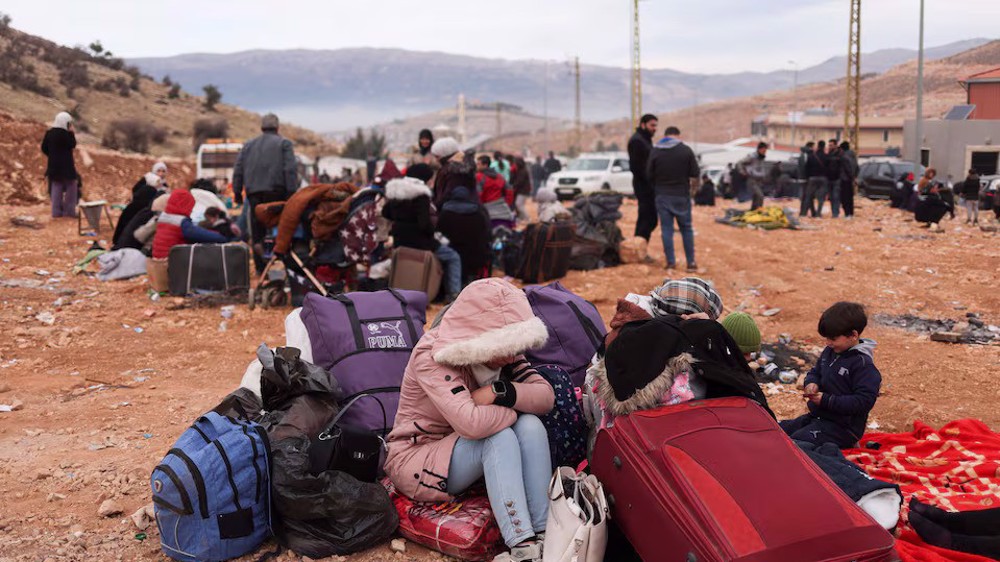AhlulBayt News Agency: The United Nations says an estimated 1.1 million people have been displaced across Syria since the resurgence of armed foreign-backed militants that led to the collapse of the Syrian government.
In a statement released on Thursday, the UN Office for the Coordination of Humanitarian Affairs (OCHA ) said that most of the newly displaced are women and children. The figures include data from when the fighting between Syrian government forces and armed opposition groups began to escalate late last month.
"As of 12 December, 1.1 million people have been newly displaced across the country since the start of the escalation of hostilities on 27 November. The majority are women and children," the statement read.
The OCHA said nearly 640,000 people have fled the Aleppo governorate, while hundreds of thousands of others left Idlib and Hama over the past few days.
It added that more than 400,000 people are currently in hundreds of collective shelters in northeastern Syria, receiving humanitarian aid, including food, hygiene kits, and psychological support.
Meanwhile, a senior Lebanese security official said on Thursday that more than 100,000 people, largely members of minority faiths, had crossed from Syria into Lebanon since Sunday.
The displaced Syrians said they had been receiving threats and fearing persecution since foreign-backed militants led by Hay'at Tahrir al-Sham (HTS) announced the fall of President Assad’s government following a rapid two-week onslaught.
At the main border crossing between Syria and Lebanon, Samira Baba said she had been waiting for three days to enter Lebanon with her children.
"We don't know who sent these threats, on WhatsApp and Facebook," she said. "The rebels in charge haven't openly threatened us, so it could be other factions, or individuals. We just don't know. But we know it's time to leave," Reuters quoted her as saying on Friday.
Militants launched a surprise two-pronged attack on Syria’s Aleppo and the countryside around Idlib on November 27. They marched southward to seize control of several major cities, including Hama, Homs, Dara’a, and Suwayda, before entering and capturing the capital Damascus early on December 8.
HTS militant group, supported by the US and its regional allies, has promised to form an inclusive government but the UN says the situation remains "fluid".
UN special envoy for Syria Geir Pedersen recently said he saw many challenges ahead for stabilizing Syria.
“While there have been developments towards interim stabilization in some aspects,” he said, “the situation remains very fluid”.
Regional countries have urged Syrians to work to avert a spiral into chaos after the HTS stormed and captured the capital Damascus.
Syria has been gripped by foreign-sponsored militancy since March 2011.
/129
In a statement released on Thursday, the UN Office for the Coordination of Humanitarian Affairs (OCHA ) said that most of the newly displaced are women and children. The figures include data from when the fighting between Syrian government forces and armed opposition groups began to escalate late last month.
"As of 12 December, 1.1 million people have been newly displaced across the country since the start of the escalation of hostilities on 27 November. The majority are women and children," the statement read.
The OCHA said nearly 640,000 people have fled the Aleppo governorate, while hundreds of thousands of others left Idlib and Hama over the past few days.
It added that more than 400,000 people are currently in hundreds of collective shelters in northeastern Syria, receiving humanitarian aid, including food, hygiene kits, and psychological support.
Meanwhile, a senior Lebanese security official said on Thursday that more than 100,000 people, largely members of minority faiths, had crossed from Syria into Lebanon since Sunday.
The displaced Syrians said they had been receiving threats and fearing persecution since foreign-backed militants led by Hay'at Tahrir al-Sham (HTS) announced the fall of President Assad’s government following a rapid two-week onslaught.
At the main border crossing between Syria and Lebanon, Samira Baba said she had been waiting for three days to enter Lebanon with her children.
"We don't know who sent these threats, on WhatsApp and Facebook," she said. "The rebels in charge haven't openly threatened us, so it could be other factions, or individuals. We just don't know. But we know it's time to leave," Reuters quoted her as saying on Friday.
Militants launched a surprise two-pronged attack on Syria’s Aleppo and the countryside around Idlib on November 27. They marched southward to seize control of several major cities, including Hama, Homs, Dara’a, and Suwayda, before entering and capturing the capital Damascus early on December 8.
HTS militant group, supported by the US and its regional allies, has promised to form an inclusive government but the UN says the situation remains "fluid".
UN special envoy for Syria Geir Pedersen recently said he saw many challenges ahead for stabilizing Syria.
“While there have been developments towards interim stabilization in some aspects,” he said, “the situation remains very fluid”.
Regional countries have urged Syrians to work to avert a spiral into chaos after the HTS stormed and captured the capital Damascus.
Syria has been gripped by foreign-sponsored militancy since March 2011.
/129

